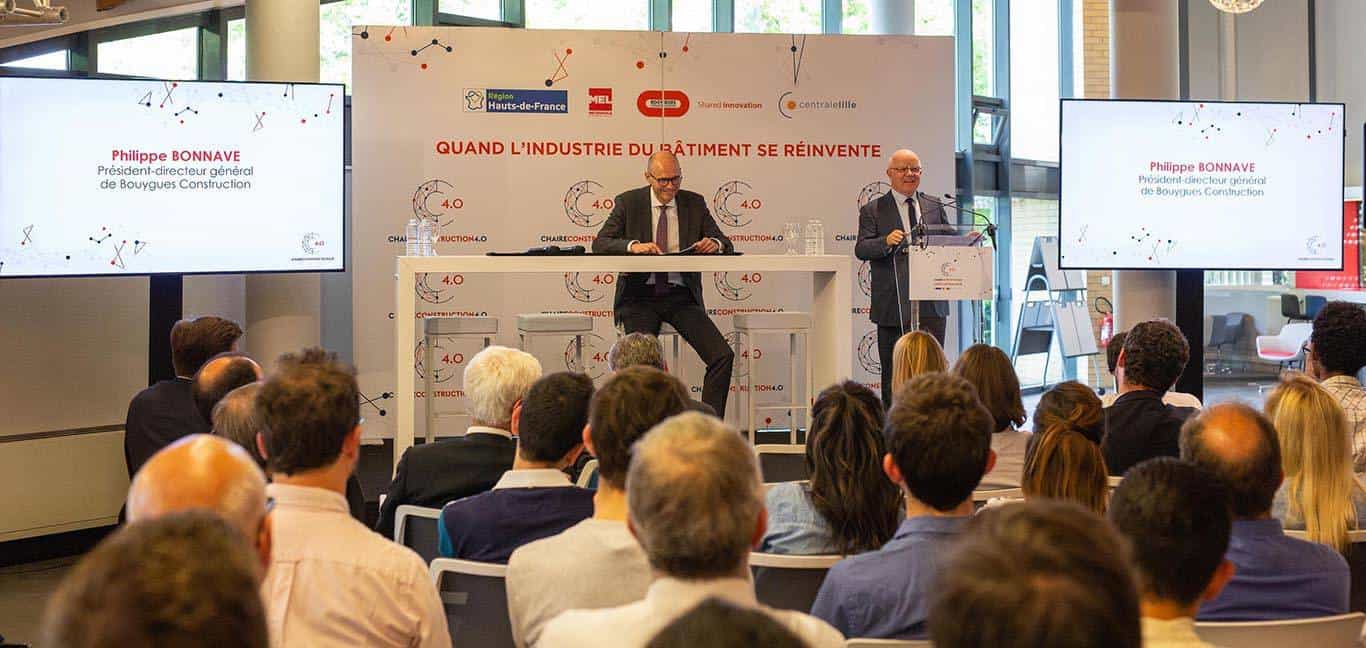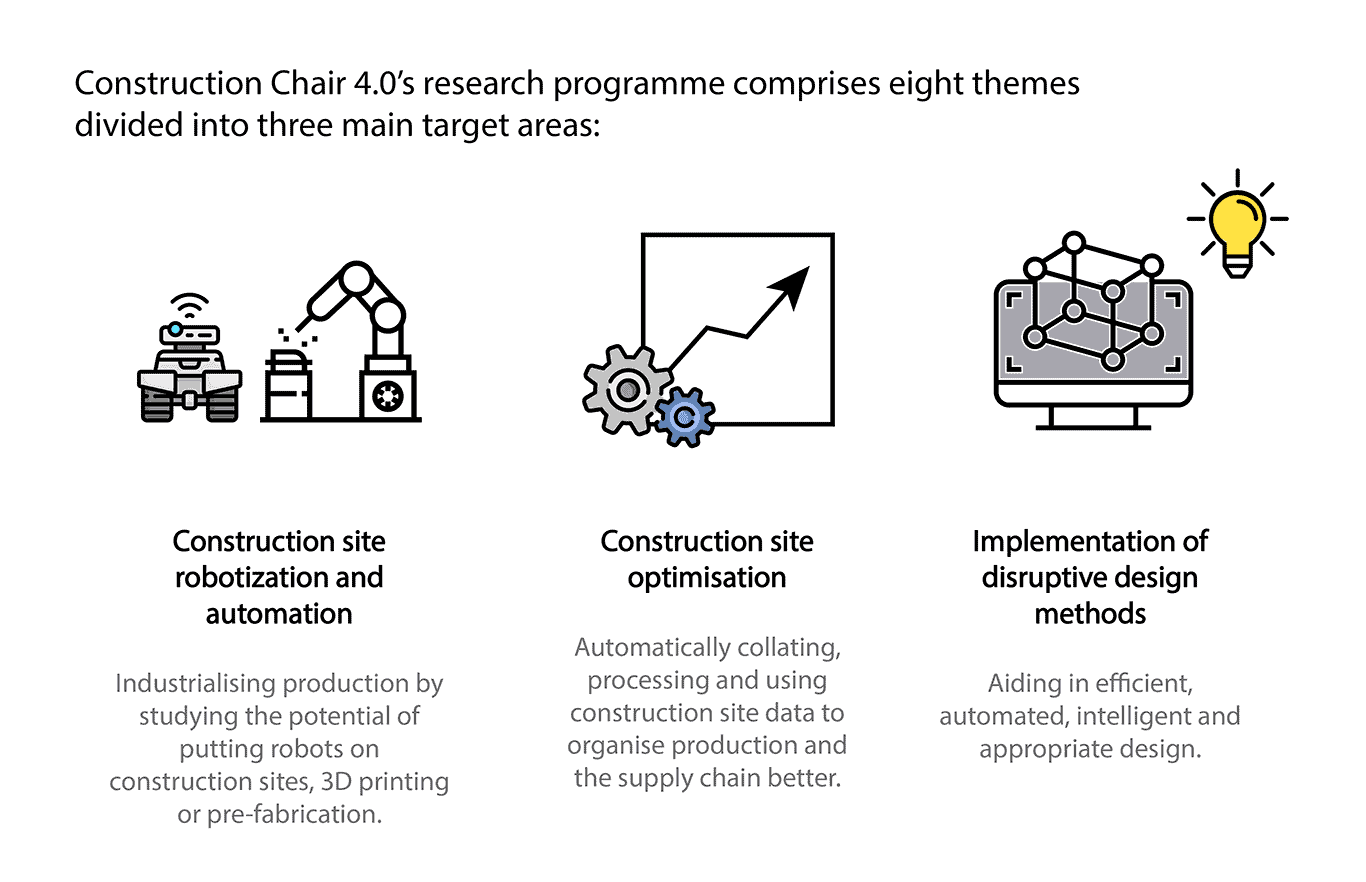
When The Construction Industry Reinvents Itself Through Construction Chair 4.0
4 minutes of reading
With the support of Hauts-de-France Regional Council and Métropole Européenne de Lille, Bouygues Construction and Centrale Lille school are launching Construction Chair 4.0 to manage the sector’s digital transition and improve productivity through digital methods and industrialisation.

Yesterday, Philippe Bonnave, Group Chairman and CEO, presented the Construction Chair 4.0 programme at Centrale Lille, where Hauts-de-France Regional President Xavier Bertrand was in attendance. Construction Chair 4.0 was jointly created by Bouygues Construction and Centrale Lille in 2017 and brings together mixed research teams or PhD students, young researchers and Group employees working together to manager the sector’s digital transition through digital methods and industrialisation.
 This official launch is a timely response to the latest studies carried out in our sector that has seen bridled productivity in recent years (due to scarce process developments, the increase in the cost of materials and also standards (environmental, quality and safety) becoming more stringent. Reducing construction costs whilst improving the quality and safety of the finished product has therefore become a key challenge for the Group, and there are many avenues open to us, in the digital sphere, particularly with the development of BIM, but also construction methods being industrialised, with data dynamics, robotics, etc. being taken into account.
This official launch is a timely response to the latest studies carried out in our sector that has seen bridled productivity in recent years (due to scarce process developments, the increase in the cost of materials and also standards (environmental, quality and safety) becoming more stringent. Reducing construction costs whilst improving the quality and safety of the finished product has therefore become a key challenge for the Group, and there are many avenues open to us, in the digital sphere, particularly with the development of BIM, but also construction methods being industrialised, with data dynamics, robotics, etc. being taken into account.
 This programme already works with renowned regional and international universities: the Polytech’Lille school, Munich Technical University (TUM), University of Arlington in Texas and ENSAM in Angers. Further down the line it will integrate other partner institutions: ETH in Zurich, NTU in Singapore, University of Alberta in Canada, as well as manufacturing partners and local start-ups, principally through the Eurotechnologies incubator.
Chair Construction 4.0 got under way operationally in 2017, specifically with the start of two theses. It has a budget of over €4 million, of which €3 million was allocated by Bouygues Construction and €300,000 by the Métropole Européenne de Lille (MEL). This partnership initiative should benefit the development of both the region’s economic and social fabric, which we all draw upon.
This programme already works with renowned regional and international universities: the Polytech’Lille school, Munich Technical University (TUM), University of Arlington in Texas and ENSAM in Angers. Further down the line it will integrate other partner institutions: ETH in Zurich, NTU in Singapore, University of Alberta in Canada, as well as manufacturing partners and local start-ups, principally through the Eurotechnologies incubator.
Chair Construction 4.0 got under way operationally in 2017, specifically with the start of two theses. It has a budget of over €4 million, of which €3 million was allocated by Bouygues Construction and €300,000 by the Métropole Européenne de Lille (MEL). This partnership initiative should benefit the development of both the region’s economic and social fabric, which we all draw upon.
 This official launch is a timely response to the latest studies carried out in our sector that has seen bridled productivity in recent years (due to scarce process developments, the increase in the cost of materials and also standards (environmental, quality and safety) becoming more stringent. Reducing construction costs whilst improving the quality and safety of the finished product has therefore become a key challenge for the Group, and there are many avenues open to us, in the digital sphere, particularly with the development of BIM, but also construction methods being industrialised, with data dynamics, robotics, etc. being taken into account.
This official launch is a timely response to the latest studies carried out in our sector that has seen bridled productivity in recent years (due to scarce process developments, the increase in the cost of materials and also standards (environmental, quality and safety) becoming more stringent. Reducing construction costs whilst improving the quality and safety of the finished product has therefore become a key challenge for the Group, and there are many avenues open to us, in the digital sphere, particularly with the development of BIM, but also construction methods being industrialised, with data dynamics, robotics, etc. being taken into account.
 This programme already works with renowned regional and international universities: the Polytech’Lille school, Munich Technical University (TUM), University of Arlington in Texas and ENSAM in Angers. Further down the line it will integrate other partner institutions: ETH in Zurich, NTU in Singapore, University of Alberta in Canada, as well as manufacturing partners and local start-ups, principally through the Eurotechnologies incubator.
Chair Construction 4.0 got under way operationally in 2017, specifically with the start of two theses. It has a budget of over €4 million, of which €3 million was allocated by Bouygues Construction and €300,000 by the Métropole Européenne de Lille (MEL). This partnership initiative should benefit the development of both the region’s economic and social fabric, which we all draw upon.
This programme already works with renowned regional and international universities: the Polytech’Lille school, Munich Technical University (TUM), University of Arlington in Texas and ENSAM in Angers. Further down the line it will integrate other partner institutions: ETH in Zurich, NTU in Singapore, University of Alberta in Canada, as well as manufacturing partners and local start-ups, principally through the Eurotechnologies incubator.
Chair Construction 4.0 got under way operationally in 2017, specifically with the start of two theses. It has a budget of over €4 million, of which €3 million was allocated by Bouygues Construction and €300,000 by the Métropole Européenne de Lille (MEL). This partnership initiative should benefit the development of both the region’s economic and social fabric, which we all draw upon. More reading
Read also




What lies ahead? 7 megatrends and their influence on construction, real estate and urban development
Article
20 minutes of reading

